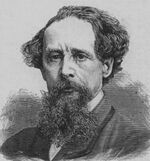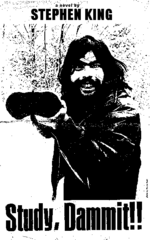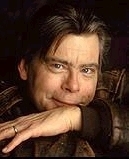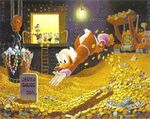HowTo:Write a Stephen King novel

|
HowTo This article is part of Uncyclopedia's HowTo series. See more HowTos |
“"Hey, this book sounds familiar..."”
So you can write English. You're a cool kid, big shot. Hell, you've got it going on. But now, one day, you are strutting around the library, looking down your upturned nose at all the books around you, and happen to glance at the check-out list. What's number one on the list? Surely one of your famed books? Alas, no! Who is this Stephen King bastard, anyway? Well, you've just got to outdo him. That'll show that haughty sonuvabitch. But how? Hmm. Guess you just have got to beat him at his own game.
Step One: A Tangible Plot
When writing a Stephen King novel, you have got to remember that they all have the same basic plot:
"It was a fine day ... AND THEN EVIL CAME!!!!!!!!!!!!!!!!!!!!!"
I hear your giggles. But, believe me, this is solid gold. It. Will. Sell.
Step Two: Characters
Chief idea of this bit is: you have to make them relatable. Your main character is a male, probably white, and certainly an author. He suffers from writer's block, and just needs to escape from it all. Perhaps a nice trip to Colorado would be just the ticket! Except, not Colorado.[1]
Secondary characters can go either way: the lead male will fall in love with a lovely but troubled young female, and have to save her from unspeakable evil, or he and his family will face mortal peril. If the man has a family, the children must be young, cute, and psychotic. They will have creepy cats and little men who live in their index fingers.
Other secondary characters will be foils--no one is really evil, just there. Usually this guy is a policeman, and he dies in the third chapter. The book will sell best if you name him or her after a familiar, comforting, well-known person, such as Miss Marple, Bob Barker, or Big Bird.
Step Three: The Monster
The monster is unseen and all-knowing. It lives in the darkest corner of your heart and comes out to play at night. It haunts the graves of unwed virgins and the violently dead infants. It prefers pepperoni to cheese. Yes, this is your monster. Treasure it, because it is your real claim to fame.
Is it a spider? A clown? A funny-looking cat? Maybe even a Motorola Razr? Whatever it is, make it good. Scary, but with character. And make it eat little children, because everyone loves cannibalism.
Step Four: The Setting
This is perhaps the most crucial part of your novel. Think about it for a moment: what natural phenomena is scary? You think . . . snow! Of course, snow. So your story takes place in . . . Alaska?
What, are you crazy? Alaska? No way, Jose. Maine! What? You mean that's actually a real place? I always thought Stephen King invented it... even though he really was from Alaska. Well, guess what: he did. But that doesn't matter. Plenty of people have plagarized other authors.[2] Besides, if you play your cards right, you will not even be accused of plagarism. So rememeber: Maine Maine Maine Maine Maine Maine Maine Maine.
Step Five: Style
Naturally, you want your book to have its own original style.[3] Here is a sample paragraph for an ideal book:
Her head was lowered, as if in shame, but he had a sudden feeling
(carrie carrie carrie)
not unlike the one he had had when he asked her to the prom.
His mind felt as if something alien was moving in there, calling
Carrie's name over and over again. As if--[4]
Of course, you cannot just copy and paste that exact paragraph. That would be too easy, and too obvious. No, an ideal, original paragraph would look a bit like this:
Her armpit was kinked, as if in joy, but he had a sudden aneurysm
(septagurina septagurina septagurina)
not unlike the one he had had when he kicked her to the Olympics.
His left thigh felt as if something French was moving in there, yodeling
Septagurina's name over and over again. As if--
Well, you should get the idea. Just take a Stephen King book of your choice, and begin filling in verbs, nouns, and adjectives as you see fit. It is a bit like Mad Libs. You can even make a game out of it, by inviting your editor over for an exciting game of Mad Libs. He will have no idea that he is helping write your novel![5]
Step Six: Publication
So you have finally written the book. Now what? You just send it off, and somebody will be sure to put it in print. That is . . .
That is, if you didn't plagiarize it. I mean, that would be completely against the rules. However, you can smooth everything over.
Publisher: So this book is an original work, correct?
You: Absolutely.
Publisher: But it is called "THE IT." Sounds kind of familiar, I mean.
You: Yup. That's 'cause I wrote it.
Publisher: Right. The main character is a struggling author with possible depression, a cute suburban family, and a dog allergy.
You: So? I think he's very relatable.
Publisher: Look, okay, it takes place in freaking MAINE. There is no such place! It's copyrighted by Stephen King, dammit!
You: Ah, but it is not pronounced "Mane." It is said, "Mah-AYN-ee."
Publisher: Oh! Well, in that case we will contact you directly with a copyright contract!
You: Bingo.
So now, this publisher is going to make it into a book. Despite the fact that it is macabre and inspiring of all conspiracy theories, it will probably sell big-time. Go to Borders on the release date, but make sure you are in disguise, as showing up at your own book opening is majorly uncool. We suggest those cute glasses with the big nose and the Hitleresque mustache.
Step Seven: And now, the moohlah
What, you really need a step seven? Are you crazy? Now, just roll around in your $3 million house in Bangor. You're chilling. You are done. Come out with another bestseller next year (see above steps) and just don't forget to take your antidepressants and drink your gin . . .
All work and no play makes Jack a dull boy. All work and no play makes Jack a dull boy. All work and no play makes Jack a dull boy. All work and no play makes Jack a dull boy. All work and no play makes Jack a dull boy. All work and no play makes Jack a dull boy. All work and no play makes Jack a dull boy. All work and no play makes Jack a dull boy. All work and no play makes Jack a dull boy. All work and no play makes Jack a dull boy. All work and no play makes Jack a dull boy. All work and no play makes Jack a dull boy. All work and no play makes Jack a dull boy. All work and no play makes Jack a dull boy. All work and no play makes Jack a dull boy.All work and no play makes Jack a dull boy.
All work and no play makes . . .
Now, remember what I said about that gin? How do you think King got along, anyway?
The Most Important Thing
Know this once and for all: every Stephen King novel is comedy. You need to keep that in mind. A book about little pink bunny rabbits, while entertaining, will not make the sales. A book about little pink bunny rabbits being eaten by mutant ghosts of Mexican murderers, however, will sell like hotcakes.
Example: A young man and his newlywed wife move into an old Victorian mansion in the copyrighted town of Castle Rock, Maine. She falls in love with the ghost of a mentally challenged beagle, and kills her husband. He comes back to haunt her, and possesses the mustard-jar. In the end, the beagle runs off with the constable. Everyone lives sadly ever after. See? Wasn't that funny?
Of course, don't use this. I really would rather you didn't. You know, for personal reasons. Since, for all you know, that story could be true.
Notes
- ↑ Too much John Denver music. You will only attract a number of elderly church-going ladies, and not an audience of all ages, races, and species.
- ↑ Hello? J.K. Rowling? The richest woman in England? You'll be a millionaire, sweetheart.
- ↑ A.K.A., completely Stephen King's style.
- ↑ King, Stephen. Carrie. 158 New York: Penguin Books USA Inc., 1975.
- ↑ Good thing, too, or else he would demand a co-authorship position. That would be bad.
| Featured version: 18 July 2009 | |
| This article has been featured on the main page. — You can vote for or nominate your favourite articles at Uncyclopedia:VFH. | |





